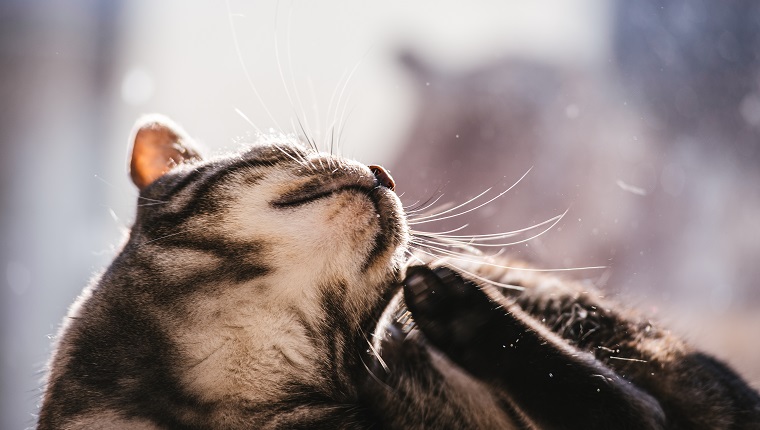Skin allergies in cats can bring on a number of skin diseases that often cause pain and itchiness.
Vets usually provide treatment by finding out the precise cause of the allergy, and in most cases, pet parents need to take ongoing preventative measures.
If you see the signs of allergies in your cat, then you must get to a veterinarian for a proper diagnosis and advice. Here’s what you should know about the symptoms, causes, and treatments for skin allergies in cats.
Symptoms Of Skin Allergies In Cats
Skin allergies in cats usually produce a number of very common symptoms. Some of the most frequently seen symptoms include:
- Scratching at itches a lot
- Scabs forming
- Loss of hair
- Sores and ulcers
In cases where a cat might have picked up an ear infection, they will also likely scratch around the area a lot.
Causes Of Skin Allergies In Cats

The precise cause of skin allergies in cats involves the immune system reacting in an inappropriate way to various conditions and aggravating ailments.
The three most common causes or triggers of these allergies include:
- Food allergens, often from a protein like fish or chicken
- Flea bites and allergens, triggered by a flea’s saliva
- Environmental allergens, which can include dust, pollen, and mold
Veterinary Treatments
If you suspect that your cat has developed a skin allergy, your vet will most likely carry out a series of tests to determine whether the precise cause of the allergy is due to food, fleas, or something in your cat’s daily environment.
This process might take a few weeks. It will likely require multiple visits and tests until the vet can determine the exact trigger of the allergy.
Treatment will depend on the underlying cause. Vets can treat flea allergies with preventative medicine. As ever, if your vet prescribes your cat any medicine, it’s important that you stick to the precise dosage and frequency instructions and complete the full course of medication.
When it comes to food allergies, your vet will prescribe a specific diet for your cat designed to illuminate whether a specific ingredient or protein could be the cause. Be warned: This process takes a couple of months as tests rule out various foods.
Allergies caused by environmental issues will again require a process of attempting to rule out certain aggravating factors.
In general, when it comes to treatment, your vet will likely prescribe your cat some form of topical medication to soothe any symptoms such as inflammation and itchiness. In some cases, they might eventually suggest the use of allergy shots.
Does your cat ever from skin allergies? What kind of allergens trigger them? Let us know in the comments section below.









